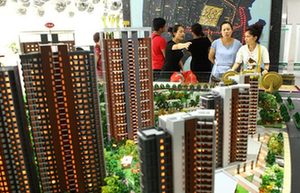More cities have eased or lifted curbs on housing purchases, but so far those moves aren't propping up the slack market, reports Zheng Yangpeng.
Weakness in the property market is prompting most cities to ease purchase restrictions and other curbs. But with negative sentiment among buyers so strong, analysts warned that local governments' moves will not help much—and might even backfire.
As of Wednesday, of the 46 cities that had imposed purchase curbs, 36 cities had publicly or quietly relaxed them, according to the 21st Century Business Herald. The remaining localities that are keeping a grip on the market include first-tier cities such as Beijing and Shanghai.
The restrictions were imposed after prices surged in 2010. The curbs included bans on purchases of multiple homes and/or tougher mortgage conditions. These policies have gone some way to curb the excessive speculation that caused the price surges.
Since the curbs were imposed, every dip in the market has prompted calls for easing. But only in the past few months has that actually happened.
"In May, any city that loosened its restrictions made the headlines. Now, people have become used to easing by one city after another," said Yan Yuejin, an analyst with Shanghai-based E-house China R&D Institute.
A delicate dynamic prevails among the central government, local governments and housing developers in terms of relaxing the restrictions. Initially, the central government took a tough stance, fearing any retreat would reignite speculation.
Developers and local governments, the latter getting the bulk of their revenue from land sales and related transactions, naturally favored a looser stance.
But after looking at the first-half figures, the central government relented. The value of housing sales in the first half of the year fell 9.2 percent, following a full-year increase of 26.6 percent in 2013. So far, the national authorities have not blocked any relaxation move by a local government.
Market participants are even speculating about whether Beijing and Shanghai, once "untouchable", would undo the shackles.
The speculation is not groundless.
First-tier cities have not been immune to the woes of their smaller counterparts. Shanghai's new home turnover in July, for example, declined 13.1 percent from June. China International Capital Corp Ltd, a State-owned investment bank, said in a report that all four large State-owned banks in Shanghai are offering discounts on mortgages.
Not everyone, however, is inspired by these developments.
Fitch Ratings Inc warned on Thursday that the easing of housing curbs could prompt renewed speculation involving residential property. It added that "another chance for the positive restructuring of the homebuilding sector in the long term" may be missed.
 |
 |
|
|
|
